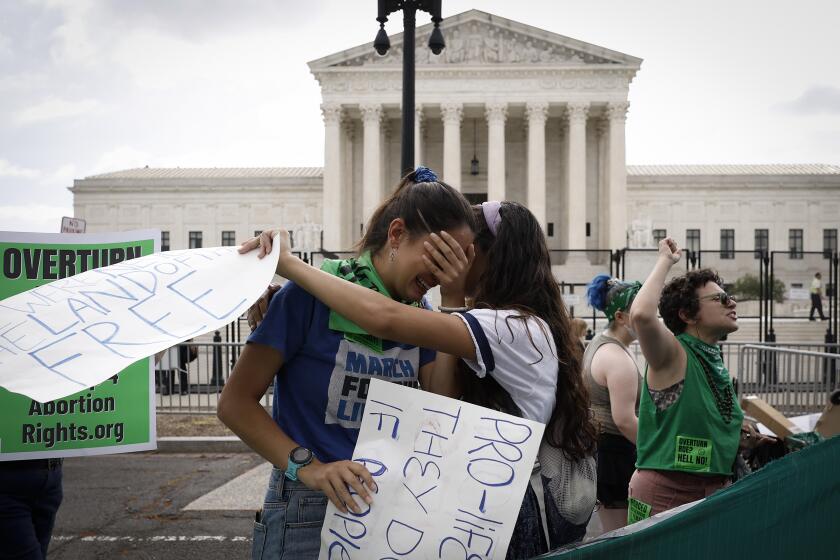Trump pardons antiabortion activists who blockaded clinic entrances

- Share via
CHICAGO — President Trump announced Thursday he would pardon antiabortion activists convicted of invading and blocking abortion clinic entrances.
“They should not have been prosecuted,” he said as he signed pardons for “peaceful pro-life protesters.”
The people pardoned were involved in the October 2020 invasion and blockade of a Washington clinic, during which a nurse was injured.
Lauren Handy was sentenced to nearly five years in prison for leading the blockade by directing blockaders to link themselves together with locks and chains to block the clinic’s doors. A nurse sprained her ankle when one person pushed her while entering the clinic, and a woman was accosted by another blockader while having labor pains, prosecutors said. Police found five fetuses in Handy’s home after she was indicted.
Trump pardoned Handy and her nine co-defendants: Jonathan Darnel of Virginia; Jay Smith, John Hinshaw and William Goodman, all of New York; Joan Bell of New Jersey; Paulette Harlow and Jean Marshall, both of Massachusetts; Heather Idoni of Michigan; and Herb Geraghty of Pennsylvania.
In the first week of Trump’s presidency, abortion foes have ramped up calls for Trump to pardon protesters charged with violating the Freedom of Access to Clinic Entrances Act, which is designed to protect abortion clinics from obstruction and threats. The 1994 law was passed when clinic protests and blockades were on the rise, as was violence against abortion providers, including the murder of Dr. David Gunn in 1993.
Trump specifically mentioned Harlow in a June speech criticizing the Department of Justice under former President Biden for pursuing charges against protesters involved in blockades.
“Many people are in jail over this,” he said in June, adding, ”We’re going to get that taken care of immediately.”
Abortion rights advocates slammed Trump’s pardons as evidence of his opposition to abortion access, despite his vague, contradictory statements on the issue as he attempted to find a middle ground on the campaign trail between antiabortion allies and the majority of Americans who support abortion rights.
“Donald Trump on the campaign trail tried to have it both ways — bragging about his role in overturning Roe vs. Wade while saying he wasn’t going to take action on abortion,” said Ryan Stitzlein, vice president of political and government relations for the national abortion rights organization Reproductive Freedom for All. “We never believed that that was true, and this shows us that we were right.”
In a historic reversal, the Supreme Court strikes down a half-century of nationwide abortion rights in the U.S.
The legal group Thomas More Society argued the FACE Act defendants they represent had been “unjustly imprisoned.”
“They have been heartened during their imprisonment and unjust prosecutions by your repeated messages to them during your campaign, urging them to persevere until you were able to take office, review their cases, and free them,” the legal group said in a January letter to Trump.
Sen. Josh Hawley (R-Mo.), among Trump’s most loyal supporters, called the prosecution of antiabortion protesters “a grotesque assault on the principles of this country” and urged Trump to pardon them while reading the stories of such protesters on the Senate floor Thursday.
Hawley said he “had a great conversation” Thursday morning with Trump about the protesters.
The news of the pardons comes ahead of Friday’s annual antiabortion protest March for Life in Washington, where the president is expected to address the crowd in a video.
Fernando writes for the Associated Press.
More to Read
Sign up for Essential California
The most important California stories and recommendations in your inbox every morning.
You may occasionally receive promotional content from the Los Angeles Times.











